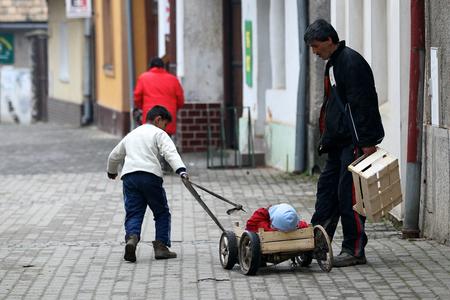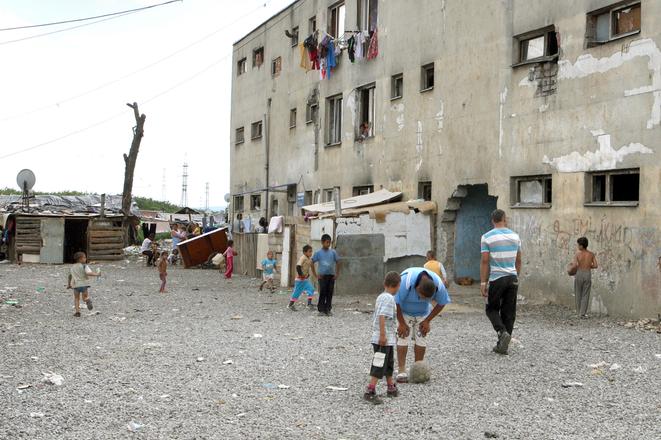Police officers presented the results to the settlement’s inhabitants on November 24. The investigator had launched a prosecution for abuse of powers of public official, violation of privacy,the misdemeanour of mayhem and the crime of torture and other inhuman or cruel treatment in January 2014 after more than 60 police officers raided the settlement on June 16, 2013 leaving several people injured.
“Since the beginning I have had a feeling that the investigation would not be objective,” Milan Hudák nicknamed Igor from the settlement told The Slovak Spectator, adding that he was beaten by baton during the raid and ended with cut on his head.
The investigator stopped the prosecution in four of six points of criminal complaint related to the abuse of power by public officials and crime of torture and other inhuman or cruel treatment. The investigation of extensive use of force when detaining persons and violation of privacy together with damage to personal property is still ongoing, according to Regional Prosecutor’s Office in Prešov spokesman Marián Spišák.
Two Roma from Budulovská filled a separate criminal complaint on the raid. The investigation in this case is still open, according to Centre for Civil and Human Rights. Spišák declined to comment on that case.
Repressive action without warrant
On June 14, two residents of the settlement were throwing stones at police officers who visited Budulovská to deal with people who were making extensive noise during a cultural event. Two days later police conducted the raid, which settlement residents believe was revenge for the earlier events.
Ernest R. was one of those two people, spending almost three months in custody despite police admitting that they had detained a man who is mentally challenged and does not understand the consequences of his aggressive behaviour.
The document ordering the raid initially wrote about searching and repressive action but later the word “repressive” was crossed out, according to Ombudswoman Jana Dubovcová who has been criticising the raid for two years.
The investigator did not find that police action was act of revenge, according to Spišák.

Police were purportedly seeking seven men with outstanding warrants. They found none of those men but according to eyewitnesses, violence ensued and 15 other Roma were taken to the police station.
Several of the Roma were injured and at least one of them contends that he underwent two more severe beatings at the police station itself. A second alleges he left the station bleeding from his rectum. ETP Slovensko, a non-profit group that works with ethnic minorities, documented the injuries with photographs.
“We are very disappointed if this is the end of the procedure because it is a case of obvious police brutality where police officers overstepped their limits,” the Executive Director of the European Roma Rights Centre (ERRC), András Ujlaky, told The Slovak Spectator. “This is definitely the wrong message for the police and the Interior Ministry. It means that you can go ahead and do what you want.”
Further complaints likely
The legal representative of one of the beaten Roma, Stanislav Jakubčík, has not seen the investigation document so far and therefore declined to comment on it. He said he nonetheless plans to file a complaint against the results.
“There are known names and posts of police officers who planned and orchestrated the police raid as an act of revenge and they should carry full responsibility for the brutal way in which residents were treated,” Jakubčík told The Slovak Spectator.
The arguments of investigators and some witnesses described in the document were surprising, according to Irma Horvátová who runs the community centre in the settlement.
“I was really surprised by what was written by some witnesses,” Horvátová told The Slovak Spectator.
She added that settlement residents are upset by the results and have completely lost their faith in state institutions. Moreover, she is worried that their aggressiveness towards police could increase as a result.
Questionable investigation
Together with Dubovcová, international organisations such as ERRC and Regional Office of the Office of the United Nations High Commissioner for Human Rights (OHCHR) have also criticised the way in which the investigation was conducted.
They point out that the prosecution started half a year after the raid took place and then it took another year and a half for the investigator to gather all testimonies and evidence before publishing the decision.
The time of investigation affects the results particularly in cases when eyewitnesses are people who could have a problem remembering details of the event, Jakubčík said during the June 2015 event commemorating the second anniversary of the raid.
“If police authorities really would like to stop police atrocities, they would act swiftly, professionally and very fast to find those who are responsible and sanction them,” Ujlaky said.
Moreover the police officers were first investigated by the Interior Ministry investigation unit, basically colleagues of the police. The prosecutor’s office which was involved later also cannot be deemed as an independent investigation body, according to Dubovcová.
“If the harmed side doesn’t withdraw it will be successful at the European Court of Human Rights (ECHR),” Dubovcová told The Slovak Spectator. “It is shameful for Slovakia, which will very likely lose this confrontation.”



 Settlement in Moldava nad Bodvou (source: SME)
Settlement in Moldava nad Bodvou (source: SME)